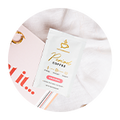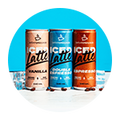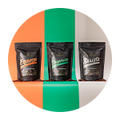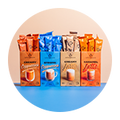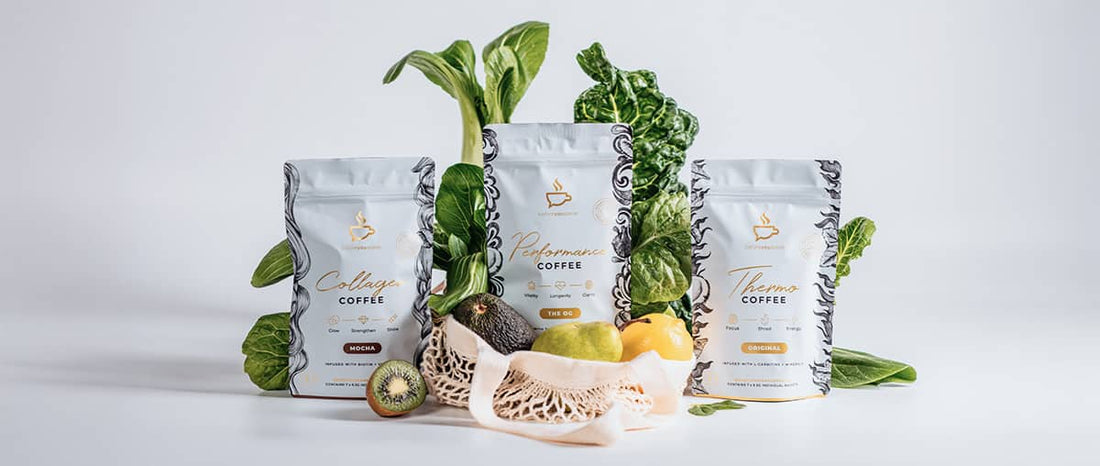Diets and lifestyle trends rise and fall in popularity each year as people look for ways to optimize their health, energy levels, and performance. While each diet has its own set of guidelines and benefits, one common denominator can enhance almost any eating plan—coffee!
Whether it’s for its natural antioxidants, metabolism-boosting effects, or it's ability to improve focus and endurance, coffee can be a game-changer when it comes to supporting your health goals. We've broken down some of the most popular diets to stand the test of time, explored how coffee fits into each one, and recommended the best vitamins and minerals to supplement for optimal results.
The Mediterranean Diet
The Mediterranean diet is renowned for its heart-healthy benefits and balanced approach to nutrition. Inspired by the eating habits of countries like Greece and Italy, this diet focuses on whole foods, lean proteins, healthy fats, and complex carbohydrates. Key guidelines include:
-
Emphasizing fresh fruits, vegetables, whole grains, nuts, and legumes
-
Prioritizing healthy fats like olive oil and fatty fish (salmon, sardines)
-
Limiting processed foods, refined sugars, and red meat
-
Encouraging moderate consumption of red wine and dairy
Benefits: The Mediterranean diet has been linked to improved cardiovascular health, reduced inflammation, better brain function, and longevity.
How Coffee & Supplements Fit In
Coffee is a perfect companion to the Mediterranean diet, thanks to its rich polyphenol content, which aligns with the diet’s focus on antioxidants. Opt for black coffee or espresso, as dairy-heavy coffee drinks may not align with the diet’s emphasis on plant-based fats. Pair your coffee with dark chocolate or nuts for an energy-boosting snack.
Best Supplements: Omega-3 fatty acids (if not consuming enough fish), magnesium (to support heart health and muscle function), and vitamin D (if sun exposure is limited).
Why Not Try: Performance Coffee! With added MCT Oil, Turmeric Extract, Ginseng and Black Pepper Extract, it's a tasty, low calorie alternative to further enhance vitality, longevity & clarity!
Intermittent Fasting (IF)
Intermittent fasting (IF) isn’t just a diet—it’s an eating pattern that cycles between periods of fasting and eating. Popular IF methods include:
-
16:8 Method: Fast for 16 hours, eat during an 8-hour window
-
5:2 Method: Eat normally for five days, significantly reduce calories for two non-consecutive days
-
OMAD (One Meal a Day): Eating all daily calories in a single meal
Benefits: IF has been linked to improved insulin sensitivity, fat loss, cellular repair, and increased energy levels. Many find it helps with mental clarity and digestion.
How Coffee & Supplements Fit In
Black coffee is a superstar for intermittent fasting because it contains zero calories and can help suppress appetite. Plus, its natural caffeine content enhances metabolism and fat oxidation during fasting periods. Just be mindful of adding sweeteners or milk, as they can break a fast.
Best Supplements: Electrolytes (sodium, potassium, magnesium) to prevent dehydration, B vitamins (for energy metabolism), and L-carnitine (to support fat utilization for energy).
Why Not Try: Unsweetened Collagen or Performance Coffee! Stevia free, low calorie and packed full of added vitamins, minerals and superfoods to support your IF routine.
The Flexitarian Diet
The flexitarian diet is a semi-vegetarian approach that encourages plant-based eating while still allowing for occasional meat consumption. It’s ideal for those who want the benefits of a vegetarian diet without strict restrictions. Guidelines include:
-
Eating mostly plant-based foods, with an emphasis on vegetables, legumes, and whole grains
-
Reducing meat intake but not eliminating it entirely
-
Prioritizing quality protein sources like eggs, tofu, and fish
-
Minimizing processed foods and added sugars
Benefits: This diet supports heart health, aids in weight management, and promotes better digestion while still providing flexibility for social eating and personal preferences.
How Coffee & Supplements Fit In
Coffee is a great fit for the flexitarian diet, as it pairs well with plant-based lifestyles. Adding plant-based milk alternatives like oat, almond, or soy milk keeps coffee dairy-free and in line with flexitarian principles.
Best Supplements: Iron (since plant-based diets may lack heme iron), vitamin B12 (if meat consumption is very low), and zinc (for immune function and recovery).
Why Not Try: Period Coffee! A tasty, vegan friendly formulation with added vitamins, minerals and superfoods. Most notably contains Iron Amino Acid Chelate, which can help offset a reduction in red meat consumption.
Low-Carb Diets (Keto, Paleo, etc.)
Low-carb diets come in many forms, but they all revolve around reducing carbohydrate intake and increasing healthy fats and protein. The most popular variations include:
-
Ketogenic Diet: Extremely low in carbs (typically under 50g/day), high in fat, moderate in protein
-
Paleo Diet: Focuses on whole foods, eliminating processed grains, dairy, and refined sugars
-
Low-Carb, High-Protein Diets: Reduce carbs while emphasizing lean protein sources
Benefits: Low-carb diets can help with weight loss, improve blood sugar control, and enhance mental clarity by encouraging the body to use fat as its primary fuel source.
How Coffee & Supplements Fit In
Coffee is a staple for many low-carb followers due to its natural fat-burning effects and ability to boost ketone production (in keto diets). Bulletproof coffee (coffee blended with butter and MCT oil) is a popular keto-friendly option, providing sustained energy without a blood sugar spike.
Best Supplements: Electrolytes (to prevent keto flu symptoms), collagen peptides (for joint and skin health), and magnesium (to support muscle function and recovery).
Why Not Try: Thermo Coffee! With added MCT, and a slew of shred promoting, all natural ingredients, it's the perfect low calorie addition to support a low carb lifestyle.
No matter which diet you follow, coffee can be a valuable ally in supporting energy, metabolism, and focus. Whether you’re sipping on a Mediterranean-style espresso, a fast-friendly black coffee, a plant-based oat milk latte, or your favourite functional brew, there’s a way to incorporate coffee into your lifestyle while maximising its benefits.
As always, please consult your healthcare professional before making any significant changes to your nutrition, or adding any new supplementation.





